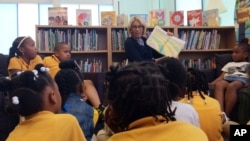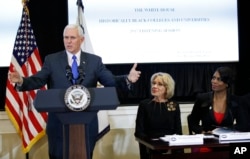When Betsy DeVos was selected by President Donald Trump to head the U.S. Education Department, some said she would do more to help charter and private schools than public schools.
DeVos, a wealthy businesswoman from the state of Michigan, said that is not true.
“Let’s be honest. There’s no such thing as a cure-all in education,” DeVos said in a recent speech. “Even the best school in the country with the best-trained educators and the most resources will not be the perfect fit for every child.”
Who is Betsy DeVos?
Betsy DeVos attended a private religious school in Michigan and also sent her four children to religious schools.
She was a former chairman of the Michigan Republican Party. She also led a group, the Great Lakes Education Project, which successfully pushed Michigan’s Legislature to allow public charter schools. Public charter schools are mostly run by private groups and can operate independently of local school districts.
DeVos also supports government vouchers that help low-income parents pay to send their children to private schools.
The Senate voted February 7 to approve her nomination as Education Secretary by a vote of 51-50. Vice President Mike Pence gave her the needed 51st vote.
Opponents and supporters speak out
Her opponents said she did not have enough education training and would move federal money to private and charter schools at the expense of public schools.
Public schools educate 90 percent of America’s K-12 students.
But defenders said DeVos, as an education “outsider,” would bring important reforms to a system that has underperformed for poor children.
First-term Republican President Donald Trump is a supporter of vouchers. As a candidate for president, he proposed $20 billion in federal money to help parents send their children to private schools.
His first budget proposal as president calls for $1 billion to allow states to move forward with more school choice. It includes $250 million to help low-income students attend private schools and another $167 million to start or expand charter schools.
As Trump’s Secretary of Education, DeVos said the budget proposal is aimed at increasing choices for parents.
“A system that denies parents the freedom to choose the education that best suits their children’s individual and unique needs denies them a basic human right,” DeVos said in a June speech to the National Alliance for Charter Schools.
Charter schools performance
But there is little agreement about the performance of students who attend charter schools, or use vouchers to attend private schools.
One of the largest voucher programs in the United States operates in the Midwest American state of Indiana.
Here is how the Indiana program works: It provides vouchers of up to $4,500, enough to cover tuition at many, but not all private schools in the state. To get a full voucher, a family of four can earn no more than $45,000 a year.
When serving as Indiana’s governor, Pence, the current vice president, oversaw a big increase in private school vouchers in his state.
Joseph Waddington of the University of Kentucky and Mark Berends of the Notre Dame University recently released a study of Indiana’s voucher program.
They looked at students in grade 3-8 who moved from public schools to private schools. On average, the students saw drops in math scores during the first and second year at their new private school. The study found no difference in test scores in English language.
Other studies found problems with voucher programs in Louisiana and Ohio. Waddington and Berends said government-supported private school voucher programs operate in 16 of the 50 American states and Washington D.C.
Robert Enlow is president of an Indiana group called EdChoice. It supports private school voucher programs.
About the research suggesting declines in math performance and no change in English test scores, Enlow said it is because most students who attend new schools “no matter how good” have a period of adjustment.
For many students, it takes time to adjust to the more difficult subjects offered at their new private schools, he said. Many parents want their students to attend religious schools that offer morality- and values-based programs.
Milwaukee first to offer vouchers
Milwaukee is the first-American city to create a scholarship program that helps low-income parents pay for tuition at private schools. The program started 26 years ago.
The city’s public school superintendent is Darienne Driver. She said the voucher program takes money away from public schools. After 26 years, it is only now that private schools receiving vouchers are being asked to show their test scores.
“So, there has been no accountability, no way to compare them with public schools,” Driver said.
Despite their differences on vouchers and other programs, Driver is not giving up on DeVos. She met with the secretary and had a telephone discussion with her.
Driver said she is pleased with the discussion. DeVos said she is willing to look at federal rules that Driver and other local school officials believe are unfair to public schools.
Proposed cuts unify supporters and opponents
Both supporters and opponents of vouchers and charter schools agree that the proposed education spending cuts of 13.5 percent in President Trump’s budget are wrong.
Driver said the cuts would make it more difficult for schools to provide special services for low-incomes students.
Jacqueline Cooper is president of the Black Alliance for Educational Options. She praised Trump for supporting federal money for private school vouchers and charter schools.
But she added that the proposed cut in federal education money is the wrong way “to put families and children first.”
I'm Jill Robbins.
And I'm Bruce Alpert.
Bruce Alpert reported on this story for VOA Learning English. Hai Do was the editor.
We want to hear from you. Write to us in the Comments Section and share your views on our Facebook Page. What kind of choices do you and your parents have about what schools you can attend?
________________________________________________________________
Words in This Story
push - v. to encourage
voucher - n. a document that gives you the right to get something such as a product or service without paying for it
suit - v. to provide what is required or wanted by someone
tuition - n. payment required to attend classes at a school
adjustment - n. a change that improves something or makes it work better
accountability - n. required to explain actions or decisions to someone







